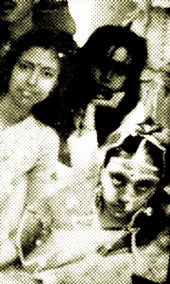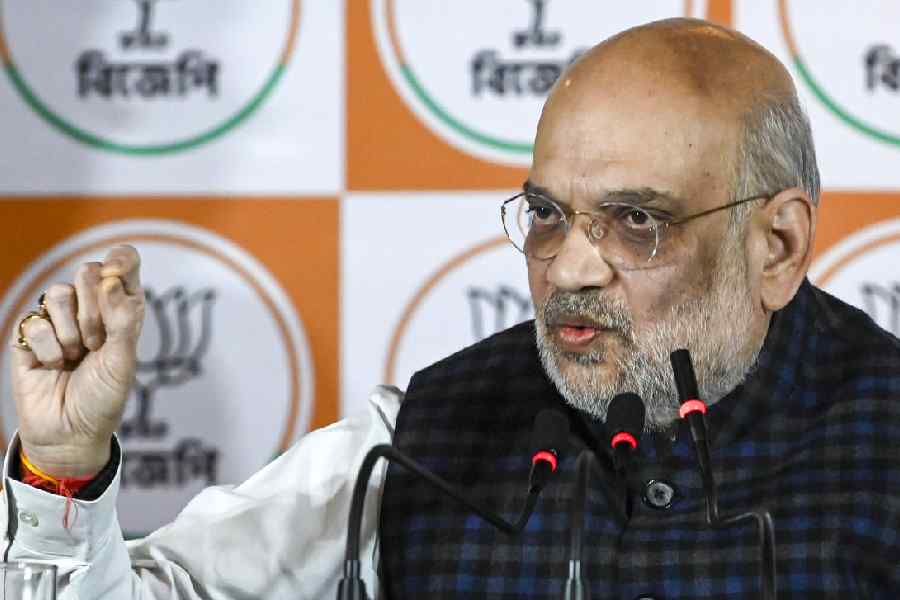 |
T“here’s only one thing that everyone out there wants to ask you,” you tell Purnima Chatterjee point-blank, “and that is, how can you, being a woman, stand by a man who has raped and killed a girl?” Purnima looks straight back at you with cold, accusing eyes. “Because I don’t want to be a widow,” she says, and you immediately regret what you said.
Standing in the cowdung-washed backyard of her mud hut on a moonlit night, in a tiny village called Jamdoga, a little way off Bankura station, she views you with suspicion.
It hasn’t been easy tracking down the wife of Dhananjoy Chatterjee, death row convict who was sentenced to be ‘hanged until dead’ for the rape and murder of a Calcutta schoolgirl way back in 1991 and then managed to give the noose the slip three times. The last time was on June 25 this year, when his family was able to extract a stay on the execution virtually at the eleventh hour with a mercy plea to the President. The media, which has been hounding out Dhananjoy’s family for comment, was especially hot on her heels. Everyone could understand why Dhananjoy’s parents might want to plead for his life. But few could fathom what bizarre compulsion would prompt a 35-year-old woman to beg for the life of a man who wronged her so terribly. No one but Purnima Chatterjee, knew the answer. And competing press people were stepping on each other’s toes trying to get an exclusive. The only information anyone could provide was that Dhananjoy’s wife had left her in-laws’ home in Kuludiha village near Chatna to escape from public glare and trying to look for her was like trying to locate a needle in a haystack.
By the time she could finally be traced in her parents’ home, it is early night. Purnima stands in the light of the full moon, wrapped in the trappings of marriage. Reduced to skin and bone — evidently from 14 years of waiting for something to happen — her stick-thin wrists are nevertheless covered in the jewellery of the married — the white conch shell bangles, the red coral bracelets and the mandatory iron wristband. A deep purplish sindoor covers the parting of her oiled hair and she is wearing a flaming red sari. If Dhananjoy is hanged, all this will have to go. And for a woman in her position, the worst thing to happen is to lose your man. Perhaps that is why she will speak no ill of him.
Like most girls in “good, Brahmin homes” in her village, Purnima grew up knowing that with marriage came the most important stage in a woman’s life, in which the husband was the most important person. And she recalls the joy she felt when her marriage was fixed in early 1989 with Dhananjoy. “One of my relatives who lived in the same village as his — as per tradition that accords superior status to a husband, Purnima still doesn’t refer to Dhananjoy by name — told my parents that there was a good match for me,” she says. Her father, Anil Mukherjee, a farmer, wanted for his daughter someone who earned a good salary. Dhananjoy had already been working as a caretaker of an apartment complex in Calcutta and according to Purnima, everyone thought he was a good catch. Purnima herself, at the time barely 21 years old, was enamoured of him. Compared to her, Dhananjoy was more educated — he completed his higher secondary education from Chatna Chandidas Bidyapith, while Purnima had only completed Class 9. “He was very handsome and everyone said we made a good couple. I became the envy of many of the village girls, because my husband worked in Calcutta. I was a proud bride. My wedding day was the happiest day of my life.”
Of course, Dhananjoy was away most of the time, but says Purnima, “he used to rush back home whenever he could. He came at least once a month and sometimes even two or three times. He used to plan to take me to the city. But I told him that we should save some money first. We wanted to enjoy the first few years of marriage on our own — watching movies and visiting places — and then settle down with children. He wanted at least one son and one daughter.”
But then one night on one of his visits home, a little more than a year after their marriage, the police came. “We were sleeping. Suddenly there was a knock on the door of our room. I could hear my mother-in-law weeping. My father-in-law was shouting. There were at least four or five policemen. They said something harsh to my husband and dragged him out. I ran after them crying, but they told me to go back.”
“I didn’t believe it then,” she says sharply when you ask her what was her first reaction when she was told about what Dhananjoy had done. “And I still don’t believe it today. He hasn’t done anything. He is not capable of doing such things. He was framed. Eshob banano golpo (They’re making it all up).”
Of course, subsequently Purnima has visited him a number of times in jail, where she says, she has pressed him for the truth. “I am human too. I did have my moments of doubt. But he has always held my hand and cried, telling me that he hasn’t done anything wrong. “Aamaakey chhuey boleychey jey kono onnay kaaj koreni (He touched me and swore he hadn’t done anything wrong).” And that is proof enough for her.
Although she does have nightmares — with terrible visions of how her husband may have abused a little girl, the same age as her own sister, Shyamoli, of whom her husband was so fond — she tells herself that it is simply not possible. “He didn’t do it,” she says with finality. “I would have believed it if he had ‘neglected’ me in anyway. But he didn’t. He used to come regularly from Calcutta to be with me. He loved me very much and he hated to go back.”
 |
| TIES THAT BIND: For Purnima Chatterjee, her wedding day was the happiest of her life |
So Purnima, along with her in-laws — including Dhananjoy’s parents and his two brothers — have been running from pillar to post to try and save Dhananjoy from the hangman’s noose. When in 1991, Dhananjoy was first sentenced to death, it was Purnima who refused to accept defeat and convinced his parents that they should fight on. When after both the Calcutta High Court and later even the Supreme Court rejected a stay on the lower court order, it was Purnima, then 25 years old, who took the initiative to travel all the way to Delhi to submit a ‘mercy plea’ to the President. That too was rejected in 1994. “That’s when I prayed to the ultimate judge, God, and he has answered my prayers. My husband has been saved twice. That is proof enough of his innocence.”
But even if Dhananjoy is pardoned, what good are her wedding fineries, if he is in jail for the rest of her life? Doesn’t she want this state of limbo to come to an end? Doesn’t she want to break free from the bondage, the shackles and the noose of 14 years of torment?
No, Purnima has other dreams, more demands. “He has already spent 14 years in jail,” she says, stubbornly. “Even Lord Ram was exiled for 14 years. But now it is time for him to come home and then we can finally be together.”
It is also time to end our conversation. As one turns to leave, Purnima walks to the tiny courtyard door and stops there. When she thinks she’s finally unobserved, her figure slumps.
One had travelled a distance to make sense of why a woman would want to hold on, more than anything else, even her own dear life, to her man. It didn’t matter that he was a rogue, a robber, a rapist or a ruthless killer.











